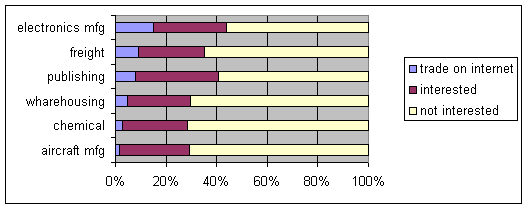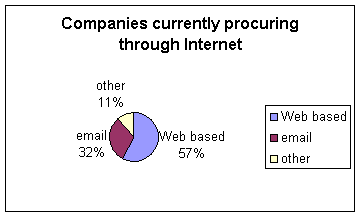
Business-to-Business E-Commerce
There is great
potential for e-commerce over the next few years since Singapore has a
well-developed Internet infrastructure, combined with strong government
support and high percentage of IT literate population. The business to
business sector accounts for about 97% of the revenue for all ecommerce
transactions. Leveraging
their existing telecommunications infrastructure, the Singapore government
would like to turn Singapore into a major e-commerce hub for Asia.
Part of this is motivated by the desire to tap into the business
opportunities and translate it into economic growth and part is being
driven by the desire to turn the country into a knowledge-based, high
value-added economy. [1]
Business
to Business
In 1998, the
government has launched an Electronic Commerce Plan to drive the use of
electronic commerce in Singapore, and to strengthen Singapore’s position
as an international e-commerce hub. See Table 1 for a summary of the
government initiatives, including laws and regulations, aimed at growing
e-commerce.
The target is
to have S$4 billion worth of products and services transacted
electronically through Singapore, and 50 per cent of businesses to use
some form of e-commerce by the year 2003.
The plan has 5 main objectives.
The objectives are listed below:
-
Develop an internationally linked e-commerce infrastructure
-
Focus on the business-to-business services
-
Implement education and support services to train and educate
-
Promote usage within private and business sectors
- Harmonize cross-border e-commerce laws and policies
|
Year |
Government Initiative |
|
1996 |
Introduction of the Electronic Commerce Hotbed Program |
|
1997 |
|
|
1998 |
|
|
1999 |
|
|
2000 |
|
Table 1 – Government Electronic Commerce Initiatives
Electronic Signatures
Singapore is one of the first countries in the world to enforce a law that
addresses the issues that arise in the context of electronic contracts and
digital signatures. In July 1998, the Electronic Transactions Act (ETA) was enacted to
provide a legal foundation for electronic signatures, and gives
predictability and certainty to contracts formed electronically.
The Singapore
Electronic Transactions Act (ETA) sets the framework for electronic laws
in many countries. The ETA addresses the following issues:
-
Commercial code for e-commerce transactions
-
Use of electronic applications and licences for public
-
Liability of service providers
-
Provision for a Public Key Infrastructure (PKI)
-
Intellectual Property Rights
Tax Issues for B2B Commerce
Goods purchased over the internet in Singapore and stay within Singapore
are subject to government tax. There
are two areas of tax laws in relation to e-commerce, Income tax and Goods
and Services Tax (GST). Any
internet based operation based in Singapore which is deemed to be revenue
generating center is liable to be subjected to income tax.
All registered GST traders must charge GST for goods delivered to a
local location. In the case of goods that are shipped overseas, no GST tax
applies.
Business
to Business - Potential
In a 1999 survey
conducted by the Centre for Management of Innovation &
Technopreneurship at NUS (CMIT), they found that
9% of all companies in select industries are currently using some
form of Internet-based B2B e-commerce.[2]
They also found that that
among the industries covered, manufacturers of electronic products showed
the highest level of current usage of e-commerce (14.9%). This was
followed by freight forwarding companies (9.2%) and publishing companies
(7.8%). See Figure 2 for further data.
In Singapore today,
more than 16% of the large companies are currently using the Internet for
B2B e-commerce. Less than 8% of the small and medium companies are
currently trading with their partners on the Internet.

Figure
2 – B2B Usage
Barriers
to Entry
Singapore
companies that are interested in adopting e-commerce cite the following as
key barriers to entry:
-
Security,
-
initial setup costs, and
-
ongoing operational costs.
Security
is the main concern for both B2B and B2C Companies.
Internet
Procurement
Among
companies currently procuring through the Internet, about one third
(31.8%) relied solely on email to communicate order information with
business partners. More than half (56.8%) use web-based trading platforms
including Internet trading communities and transaction-enabled websites.

Figure 2: Source: NCB B2b E-Commerce 1999 Survey
Business
to Business Revenue
Among
companies currently procuring through the Internet, more than 95% report
actual purchase volumes of less than $100,000 per month. There is a small
proportion among this group of companies (1.6%) who are already procuring
in excess of $10 million over the Internet. In comparison, about 88.2% of
the companies planning to use Internet-based procurement expected less
than $100,000 worth of monthly purchase volume.
[1] Veloo, Peter. 1999. E-commerce forum to give Singapore a
boost. CNET. 10, September.
[2] Centre for Management of Innovation &
Technopreneurship at NUS (CMIT),
[3] Peck, Casuarina. 2000. E-commerce In Singapore To
hit US$2.1B By Year-end
Singapore
Internet dot com. 22, November.
[4] ibid
Text goes here.......
Text goes here....